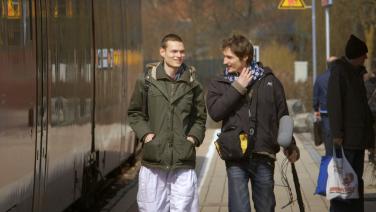
Bruder Jacob, Eli Roland Sachs, Germany , 2016, 92’, OV with Spanish subtitles
How is it possible to record, share and question the radical metamorphosis of someone close to you into another person, and turn it into a movie?
Director Eli Roland Sachs describes, in the first person, his brother Jakob’s process of revelation and crisis of faith, and the effect of this situation on his family and friends.
“Jakob is my beloved little brother. One day he changed and started calling himself Salafi. Instead of doing what young people of his age did and go to the nightclubs of Berlin to listen to music, smoke and philosophise with his classmates, his new faith put him above everything and replaced his relationships with me and with others.”
This is how the director remembers the start of things, and out of this need to understand such a radical change comes this documentary film: the director depicts and accompanies his brother Jakob, a young German who decides to convert to Salafism after a trip to Morocco. The film is based around a series of letters between the brothers, talks with the family, meetings with the Muslin community and various interviews with Jakob to try and unravel something which is very hard to explain: faith, beliefs, fundamentalism, radicalism, and the search for a spiritual and meaningful direction. That is, the search for a place in the world. The documentary contains some powerful intimate moments, such as when Jakob's wife describes her feeling of loneliness and complete sadness at being excluded for wearing the burka.
The film goes further yet, and after six years of conversion and in-depth study of Islam, Jakob decides to abandon this religion for another which he considers to be purer: Bahaism. This is when the film really gets going and asks questions about the place of religion in our daily lives, and about such complex concepts as truth, crisis, search and enlightenment. The end result is an entire thesis on the relationship between the world and religions, and on the role of the latter in defining personality and relationships with others,
“With my camera, I’m trying to repair a sense of brotherly love with Jakob, like it used to be. It takes a little time before Jakob lets me get closer to him, but in the end we start talking again. I go with him to his mosque, I talk with his Imam, I meet his new brothers, and his wife. Little by little I start to understand Jakob’s highly personal view of Islam. But my brother’s transformation continues, and I wonder if I’ll be capable of seeing the human being behind that figure, beyond the believer.”
